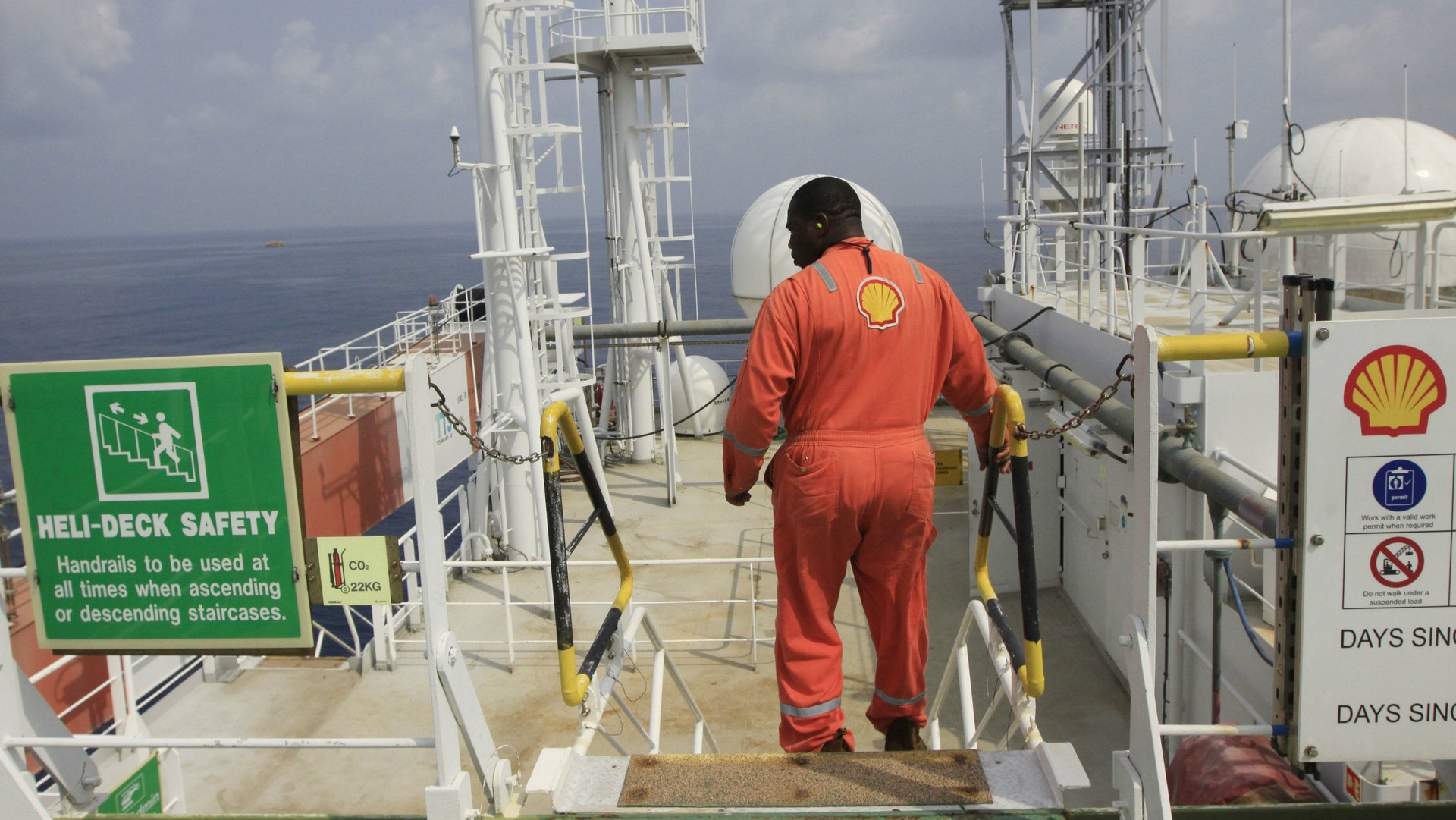Shell was complicit in a billion-dollar corruption scandal for a lucrative Nigerian oilfield
This story has been updated.


This story has been updated.
Royal Dutch Shell’s checkered history while operating in Nigeria has taken another bad turn.
The oil giant is mired in a billion-dollar bribery scandal over its 2011 acquisition of OPL 245, a vast undeveloped but lucrative Nigerian oilfield off the coast of the Niger Delta. Shell first acquired a stake in the oilfield back in 2001 alongside Malabu, a company allegedly controlled by Dan Etete, Nigeria’s oil minister between 1995 and 1998. Etete is believed to have acquired the rights to the oilfield under questionable circumstances while serving as minister.
After two decades of legal wrangling over ownership of the oilfield, in 2011, Shell, in collaboration with Italian oil company Eni, paid the Nigerian government $1.3 billion to acquire OPL 245. But that money never went into the public trust, as it should have. Instead, nearly all of it went to Etete who was convicted of money laundering in France in 2007. Through Etete, much of the money is believed to have ended up being shared by high-ranking Nigerian government officials in a series of political kickbacks with Shell fully aware.
Shell initially denied knowledge of payments made to Malabu, Etete and any other Nigerian officials, saying that its dealings with regard to the acquisition of OPL 245 were legal and that none of the questionable payments “were made with its knowledge, authorization or on its behalf.” But a trove of emails published by anti-corruption charities, Global Witness and Finance Uncovered, suggest that is not the case. Indeed, the emails show “evidence” of Shell’s senior employees “knowingly participating in a vast bribery scheme,” according to Global Witness.
The emails show correspondence between senior Shell officials acknowledging the possibility that almost all the money paid for OPL 245 could be passed to government officials, through Etete, in underhanded deals. Following the published emails, in a reversal of prior denials, Shell has now admitted that it engaged with Etete during negotiations to acquire OPL 245. For its part, an Eni spokeswoman told Quartz the company, through its Nigerian subsidiary, paid “exclusively to the Government of Nigeria in respect of title to OPL 245” and that the company “did not pay any money other than as contemplated and recorded by the Block Resolution Agreement” to “Malabu, to Chief Dan Etete or to any public officer.”
The stink of the scandal reached all the way to the presidency with Goodluck Jonathan, the then-president, named as a beneficiary in documents from Italian prosecutors. Jonathan is said to have received nearly $500 million, which was split with other high ranking members of his administration, including Diezani Alison-Madueke, his embattled former minister of petroleum. For his part, Jonathan has denied any wrongdoing, claiming the allegations are sponsored by people threatened by his “continuously rising profile in the international community.” Italian prosecutors have recommended that Claudio Descalzi, Eni CEO, stand trial for corruption.
Shell took the risk of getting caught up in such a murky deal because of the value of the asset at stake. OPL245 is one of Africa’s largest undeveloped oilfields with an estimated nine billion barrels of “probable reserves,” according to Global Witness. Acquiring the oilfield could have also seen Shell’s global “proven oil reserves” increase by a third, Global Witness says.
While OPL 245’s probable reserves could generate $500 billion worth of oil at current market prices, that’s not necessarily a measure of its actual worth, Dolapo Oni, head of energy research at Ecobank Development Company, tells Quartz. With attendant costs and taxes accompanying eventual exploration of the oilfield, Oni says, based on 2011 oil prices, OPL 245’s actual value was likely around $1.9 billion—$600 million more than Shell and Eni paid for it.
But while the deal clearly enhances Shell, it’s at the detriment of Nigerians. For decades, government officials have been accused of flitting away the country’s oil wealth and pocketing large sums of cash through corrupt dealings. The sale of OPL 245, for less than its actual value—most of which went into private pockets—captures that sentiment.
Active in Nigeria since the 1950s, the latest scandal does nothing to boost Shell’s battered reputation among locals, particularly in the oil-rich Niger Delta. The company’s fractious relationship with the region is linked to the 1995 executions of nine Niger Delta leaders, including popular activist, Ken Saro-Wiwa. Shell has been accused of collaborating with the Nigerian government in the executions and, in 2009, the company agreed to pay $15.5 million as compensation to affected families.
The company is also notorious for the adverse environmental impact of its work in the Niger Delta. Severe oil spills have resulted in large-scale devastation and pollution which will likely take decades to clean up. In one of such cases, Bodo, a community in Niger Delta, received a $83 million payment from the oil giant in what was the largest ever out-of-court oil spill-related settlement in Nigeria.